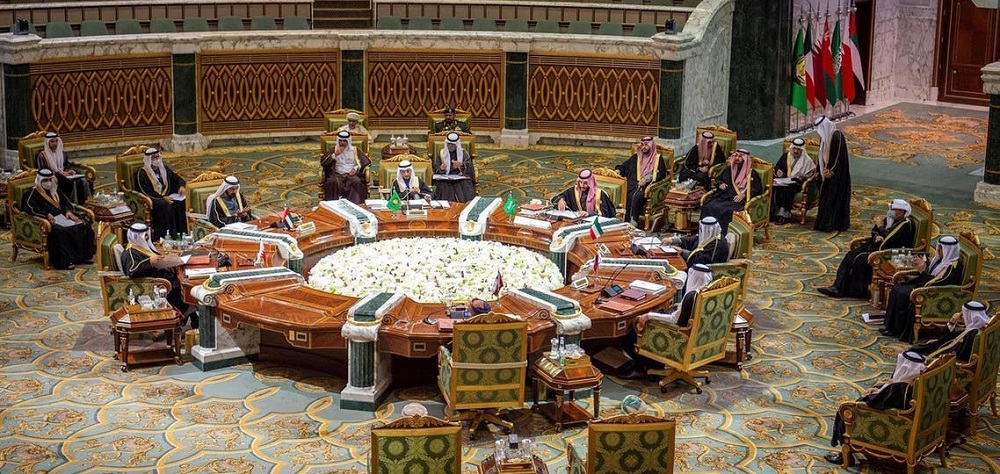AhlulBayt News Agency (ABNA): The 42nd (Persian) Gulf Cooperation Council summit was held on Tuesday in the Saudi capital Riyadh. Saudi Press Agency reported that the meeting concluded in a statement calling for unity, solidarity, and stability in relations among the member states.
On the one hand, the recent meeting was the first since the ostensible end of the big crisis in the Cooperation Council. On the other hand, it is held as the Yemeni crisis continues to unfold in circumstances different from those of the start of war, and the constant question of security remains strong with evidence of the gradual reduction of US military presence in the region. Nuclear talks between Iran and world powers are another important part of the sensitive developments that the Cooperation Council is pursuing.
Security and stability riddle
SPA reported that the leaders of the (P) GCC insisted on commitment of the members to collective response to all threats and challenges.
One of the main agendas of Tuesday summit was the reconstruction of the military-security alliance in the Cooperation Council, because in recent years the inefficiency of the existing mechanisms for resolving disputes as well as joint confrontation of security threats has fully showed itself. This situation over the past decades has led to outward looking for security and consequently dependence on foreign actors for protection.
Now as the US is reluctant to involve more in West Asia conflicts and even foreign powers are showing inability to fill the security vacuums, the (P) GCC states are growing concerned about the future crises, something motivating them to considerably put on their agenda rebuilding their common military and security cooperation mechanisms, among them Peninsula Shield Force.
Recent defense ministers meeting and the decision to set up a "unified command center" in Riyadh bear witness to these efforts.
The members agreed on economic unity, common defense and security system, coordination of positions to strengthen solidarity and stability of the six-member bloc, protection of interests, avoidance of regional and international conflicts, meeting the demands of citizens, and strengthening the bloc regionally and internationally, said the concluding statement read by the Cooperation Council Secretary-General Nayef al-Hajraf.
The statement further said that any attack on a member would be considered an attack on all members.
"Any threat posed to one member is posed to all members," the statement read.
However, neither slogans of military alliance will end members' security concerns nor will claims to maintain stability put an end to instability in the region. The Saudi lack of seriousness to end the war in Yemen is a matter that shows itself in the fact of the daily bombing of the Yemeni civilians and the continuation of the full-scale siege of this crisis-stricken country. Actually, talking the talk bout a political solution to the crisis without walking the walk cannot go anywhere. Therefore, building unity, combating instability, and increasing the security factor first require a review of interventionist, belligerent, and crisis-creating policies which are the biggest cause of insecurity and instability in the Persian Gulf.
Differences would remain in place
With the end of the three-year Qatar crisis, the Cooperation Council is once again trying to show a consensus and united voice, but the 2017 rift marked a turning point in the bloc's four-decade history, laying bare its fundamental divisions and differences. Ideological differences, including ongoing Saudi and Emirati pressure on Muslim Brotherhood-affiliated movements on the Peninsula, geopolitical rivalries, and political differences, especially on relations with Iran, cannot simply settled by release of statements.
There is also an economic aspect to their differences. Although the bloc viewed the recent summit as an opportunity to discuss long-term project, like common market and common customs union, economic citizenship, and Persian Gulf railway, differences continue to exist. Oman, for example, said it would not join an economic union. This stance has been held for years.
Also, despite highlighting the significance of cooperation to increase investment, they are in intensive competition for attracting foreign investment and larger oil output quota.
In February, Saudi Arabia announced it would suspend granting government contracts to companies and businesses with headquarters outside the kingdom— an action meant against the UAE. Reacting to the Saudi move, Nasser al-Sheikh, former Chief Officer at Dubal Financial Office, said the decision was "against the principles" of the common market project.
In July, Riyadh and Abu Dhabi also were in a standoff over crude output quota at OPEC Plus, which includes non-member oil producers. The UAE argued that the ceiling for its output was so low, a claim disputed by the Saudis.
/129

